Executive Team
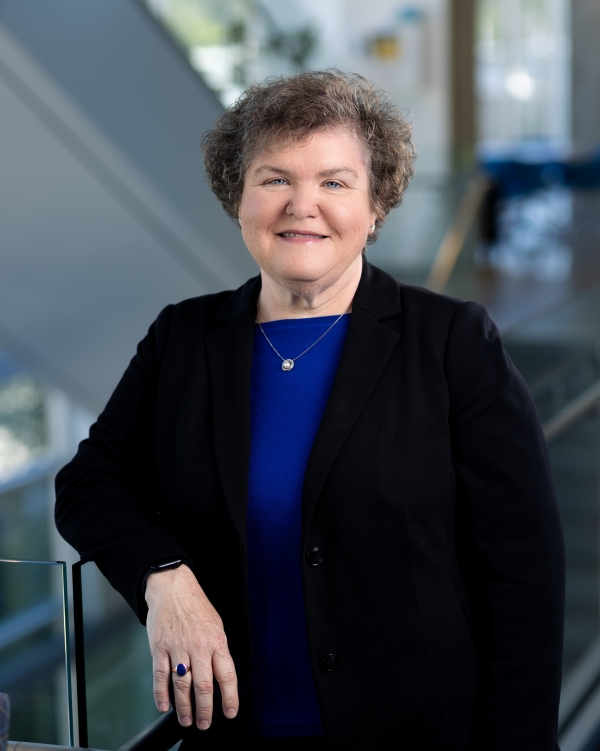
Job Position: President and Chief Executive Officer
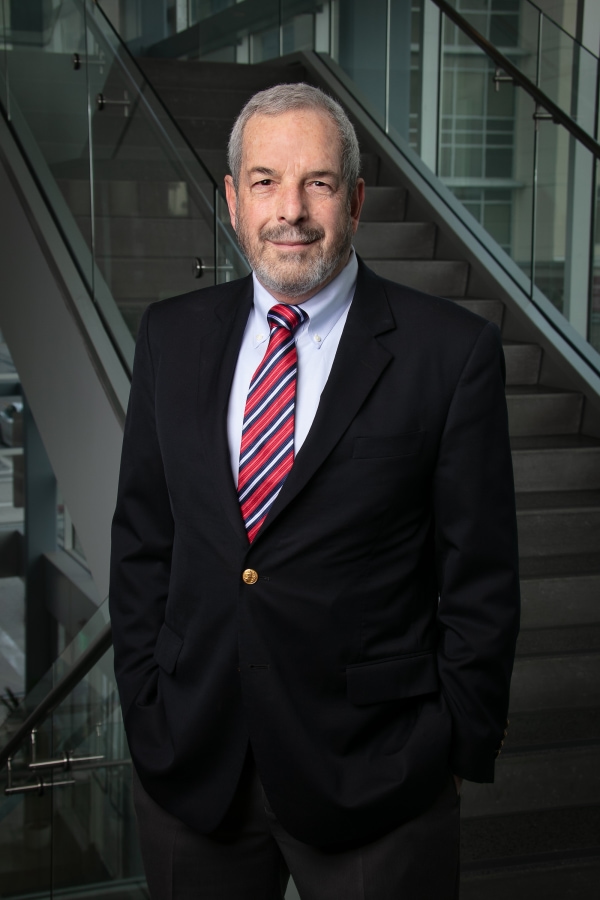
Job Position: Chief Science Officer
Chair and Scientific Director of Cardiovascular Research

Job Position: Chief Operation Officer

Job Position: Chief of Staff

Job Position: Vice President of Development
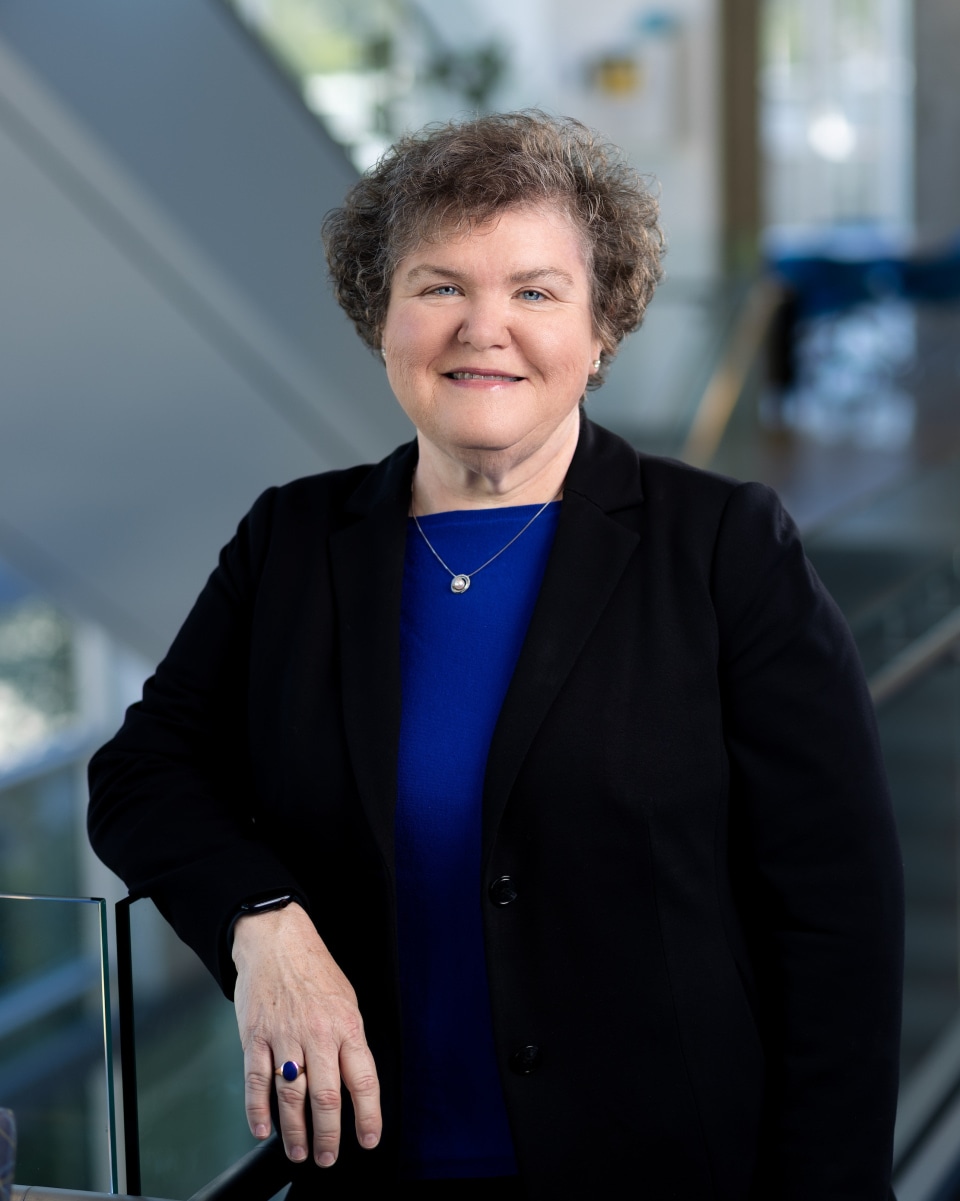
Julia E. Bradsher, PhD, MBA
President and Chief Executive Officer
Julia E. Bradsher, PhD, MBA, president and CEO of HMRI, is a successful scientist and strategic leader committed to excellence in biomedical research. She directs the organization in a focused strategy to achieve HMRI’s vision of becoming a leading biomedical research institute in the United States. Influenced by Dr. Bradsher’s passion for equity in healthcare, HMRI’s track record of scientific discoveries is now laser-focused on improving public health by solving the greatest medical challenges of the heart and brain. Under her dynamic leadership, Dr. Bradsher manages the executive team and an operational budget that has grown from $8 million in 2018 to $14 million in 2023. She is dedicated to advancing HMRI’s education programs – to inspire the next generation of scientists, physicians, and leaders in biotech.
Throughout her career, Dr. Bradsher has held numerous leadership and management roles. Prior to joining HMRI in 2018, she served as the President and CEO of the Food Allergy and Anaphylaxis Network and the International Food Protection Training Institute (IFPTI). She was a research scientist at the New England Research Institute and a faculty member at the University of California, San Francisco, Sonoma State University, and San Francisco State University.
Her advanced degrees include a PhD in medical sociology from the University of Miami, an MS in gerontology from Baylor University, an MBA from Suffolk University, and a BS in psychology from Suffolk University. She completed the Pew Charitable Trust postdoctoral Fellowship in Health Policy in a joint program at the University of California, San Francisco’s Institute for Healthy Aging. Dr. Bradsher served on numerous boards of nonprofit organizations and for-profit companies. She is a Leadership Fellow of the National Association of Corporate Directors (NACD) and an NACD-certified corporate director.
Dr. Bradsher is a sought-after speaker and was recognized by the Los Angeles Business Journal as a Woman of Influence in Health Care. She is a nationally recognized advocate for STEM education, focusing her time on mentorship for young people pursuing STEM careers. Dr. Bradsher is an ardent advocate for scientific discovery in biomedical research, and at HMRI, she continues to advance a culture where scientists can do their best work.
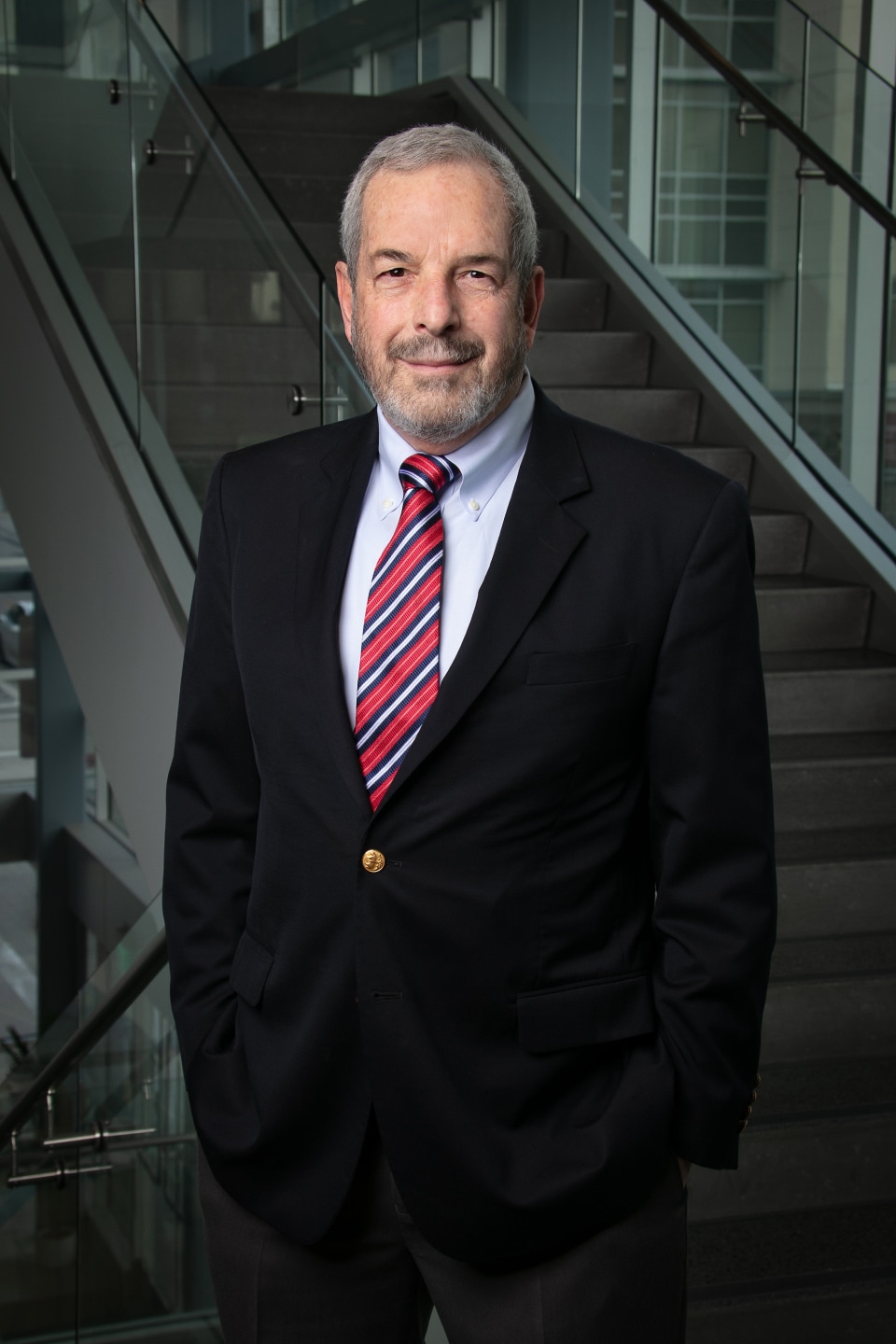
Robert A. Kloner, MD, PhD
Chief Science Officer
Chair and Scientific Director of Cardiovascular Research
Dr. Robert A. Kloner has spent more than 45 years running nationally and internationally known cardiovascular research programs – in some cases building them from the ground up – creating centers recognized for scientific excellence and innovation. In addition to his many roles at HMRI, he also serves as Professor of Medicine (Clinical Scholar) at the University of Southern California’s Keck School of Medicine and Visiting Associate at the Aerospace Division of Engineering and Applied Science at California Institute of Technology (Caltech) in Pasadena, CA. Dr. Kloner has made major contributions to science, including the pathophysiology of heart attack; treatments for heart attack; triggers of cardiovascular events; studies on high blood pressure and heart failure; the effect of toxins like alcohol, cocaine, e-cigarette use and pollution on the heart; stem cell therapy for the heart; and the intersection between sexual dysfunction and cardiovascular disease. A frequent contributor to the medical and scientific press, he has authored or co-authored over 774 original papers in peer-reviewed journals, 222 chapters or monographs, and 574 abstracts (as of 2024). His H index is 137 and he has over 87,350 citations to his published papers.

Mark Dixon
Chief Operation Officer
Mark Dixon is the chief operations officer of Huntington Medical Research Institutes. As a collaborative leader, he is driven by a deep commitment to advancing the understanding of human health and diseases through continuous operational support for laboratories and facilities. He provides an environment where researchers can freely access HMRI’s state-of-the-art facilities to collaborate seamlessly with the institutes’ core services. By leveraging the latest scientific advances and innovative technologies, HMRI can make significant strides in improving the lives of individuals impacted by diseases of the heart and brain. He is dedicated to fostering a culture of excellence within the institution through rigorous research, high-quality data, state-of-the-art facilities, and ethical conduct.
Prior to his current role, Mark served as HMRI’s director of Core Laboratory Operations and Environmental Health and Safety and vice president of Laboratory and Facilities Operations. He now oversees the institutes’ operations and compliance, which are crucial to the success of HMRI’s biomedical research. Mark’s team is responsible for the daily operations of the laboratory and facilities functions, including oversight of the institutes’ Vivarium, Analytical and Biochemistry Core, Cellular Imaging Center, and all facilities operations of our biomedical research building.
Mark has over ten years of experience in research chemistry and laboratory operations management for organizations specializing in analytical biochemistry, cell biology, tissue and cell culture, advanced imaging, histology, and microbiology. He is an Executive MBA candidate at the UCLA Anderson School of Management, and he earned his MS in Food Safety and BS in Nutritional Science at Michigan State University. In his role as COO, Mark serves as the Chairperson for the Institutional Animal Care and Use Committee (IACUC), Research Integrity Officer (RIO) of the Office of Research Integrity, and Biosafety Officer.

Wendy Welch-Keller
Chief of Staff
Wendy Welch-Keller is the chief of staff at Huntington Medical Research Institutes and is responsible for supporting all aspects of the Office of the President and Board of Directors. As a trusted colleague to the CEO and board members, Wendy is known for effectively executing communication and coordinating institutional and board matters that are essential to HMRI’s success. Her leadership is key in advancing HMRI’s institutional strategy by strengthening relationships with internal and external stakeholders.
Wendy brings decades of dynamic experiences and expertise to HMRI from corporate and nonprofit arenas, including her role as a corporate secretary of a $4 billion financial institution. She is a sought-after team member who fosters an inclusive and collaborative culture that empowers and leverages the strength of HMRI’s leadership team. Wendy is an inspirational example of leadership, collaboration, and organization. She is a valued resource at HMRI and in the local community, where she has led initiatives to help others advance in their careers.

Paul Roach
Vice President of Development
Paul Roach, vice president of development at Huntington Medical Research Institutes, is a strategic nonprofit leader dedicated to advancing biomedical research through philanthropic partnerships. He leads HMRI’s philanthropy, communications, and marketing efforts, with a focus on securing significant gifts, cultivating enduring donor relationships, and aligning philanthropic priorities with the institute’s vision for scientific impact. Guided by a commitment to donor-centered engagement, he works closely with the board of directors, executive leadership, and community partners to strengthen the institute’s resources for research and education. His efforts have supported initiatives ranging from new pilot studies to naming gifts to launching new legacy giving programs, helping HMRI secure funding to address the most pressing challenges in heart and brain health.
Before joining HMRI in 2023, Roach held senior development leadership roles at Shoes That Fit, the American Museum of Ceramic Art, Claremont Graduate University, and Pomona College. His career spans higher education, the arts, and nonprofit research, with a record of building agile fundraising programs and fostering cross-sector collaboration.
Roach earned his BA in English from Pomona College. He currently serves on the Board of Directors and Executive Committee of the Claremont Senior Foundation and as co-host for Development Programs at the Association of Independent Research Institutes. He previously served on the Board of Directors and Executive Committees of SoCal Museums (a professional association of museum communications professionals), the Collegiate Dancesport Association, USA Dance, and on the City of Pomona’s COVID-19 Task Force.
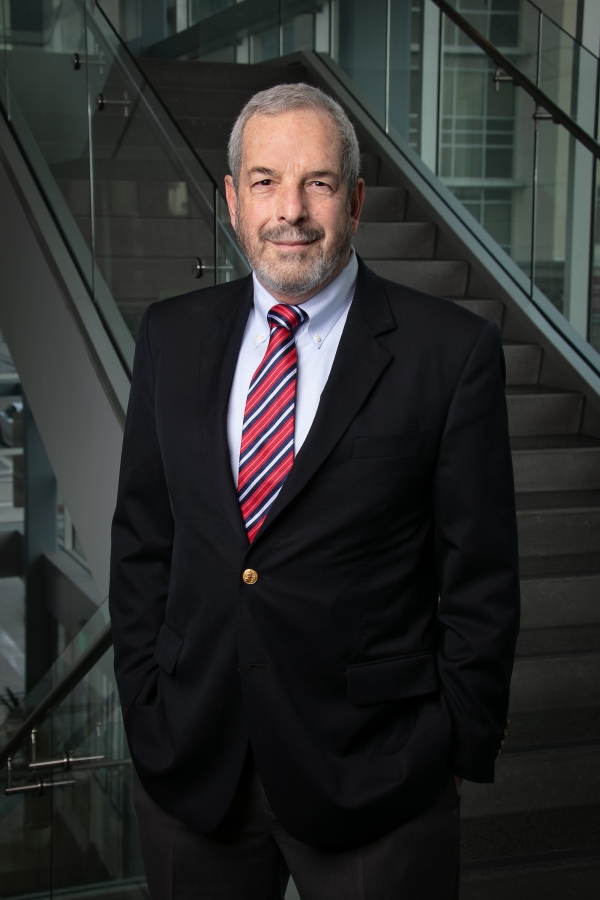 Cardiovascular Research Laboratory" width="600" height="750">
Cardiovascular Research Laboratory" width="600" height="750">
Job Position: Chief Science Officer
Chair, Cardiovascular Research
Cardiovascular Research Laboratory
 Cardiovascular Signaling Laboratory" width="600" height="750">
Cardiovascular Signaling Laboratory" width="600" height="750">
Job Position: Professor, Cardiovascular Research
Scientific Director, Education Programs
Cardiovascular Signaling Laboratory
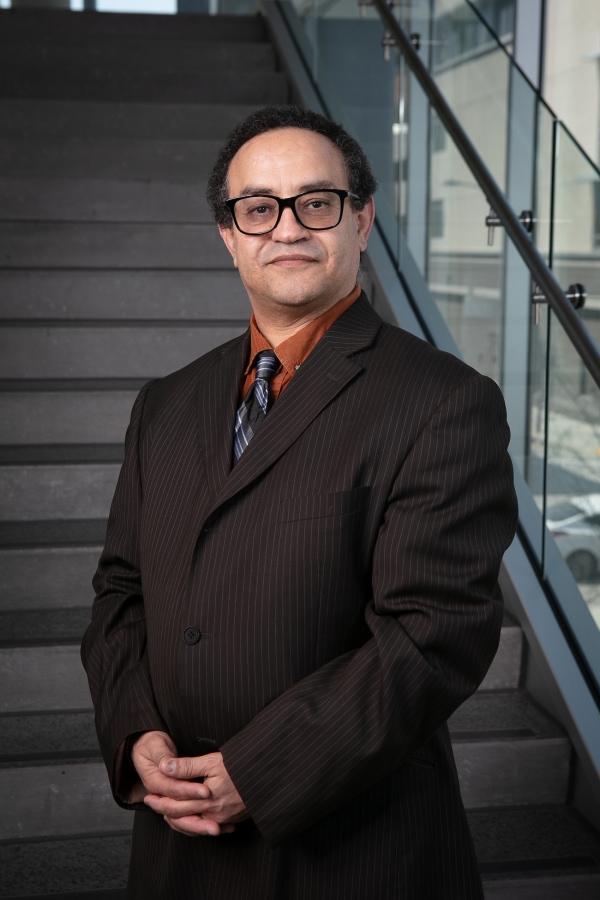 Neuro- Cardio- Immunology Laboratory" width="600" height="750">
Neuro- Cardio- Immunology Laboratory" width="600" height="750">
Job Position: Assistant Professor, Immunology
Neuro- Cardio- Immunology Laboratory
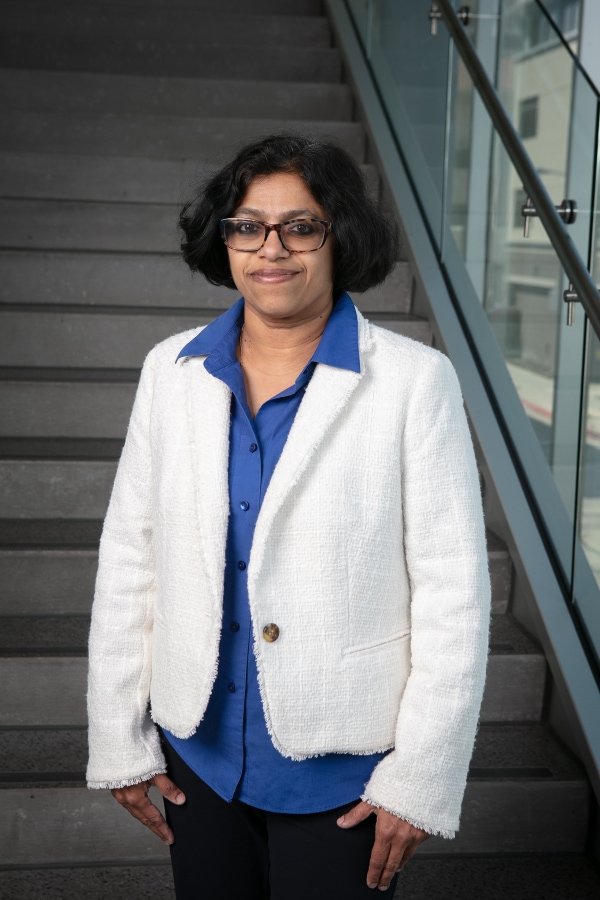 Angiogenesis and Brain Development Laboratory" width="600" height="750">
Angiogenesis and Brain Development Laboratory" width="600" height="750">
Job Position: Professor, Chair and Scientific Director
Basic and Translational Neurosciences
Angiogenesis and Brain Development Laboratory
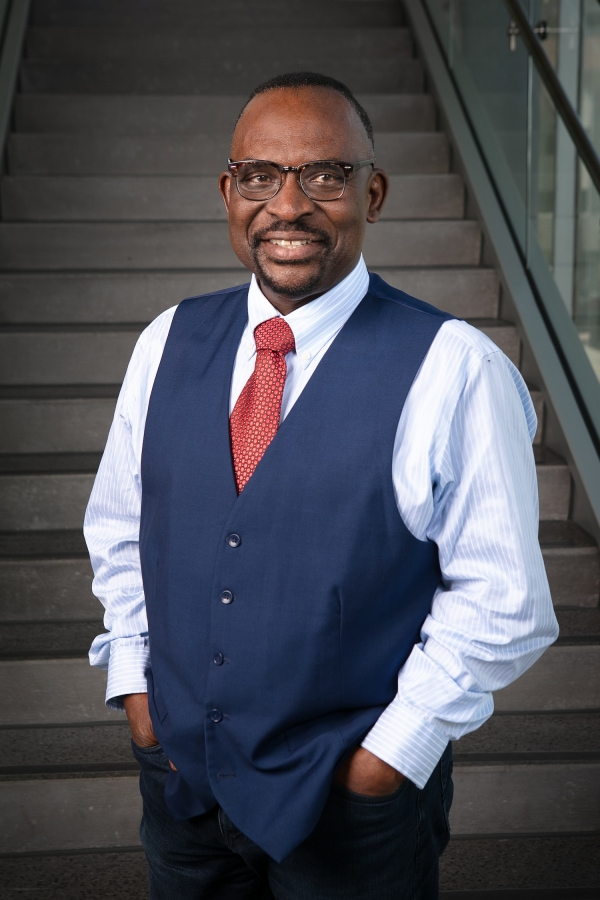 Biomarker and Neuro-disease Mechanism Laboratory" width="600" height="750">
Biomarker and Neuro-disease Mechanism Laboratory" width="600" height="750">
Job Position: Research Professor, Clinical and Translational Neurosciences
Biomarker and Neuro-disease Mechanism Laboratory
 Cognition and Brain Integration Laboratory" width="600" height="750">
Cognition and Brain Integration Laboratory" width="600" height="750">
Job Position: Associate Professor, Clinical and Translational Neurosciences
Cognition and Brain Integration Laboratory
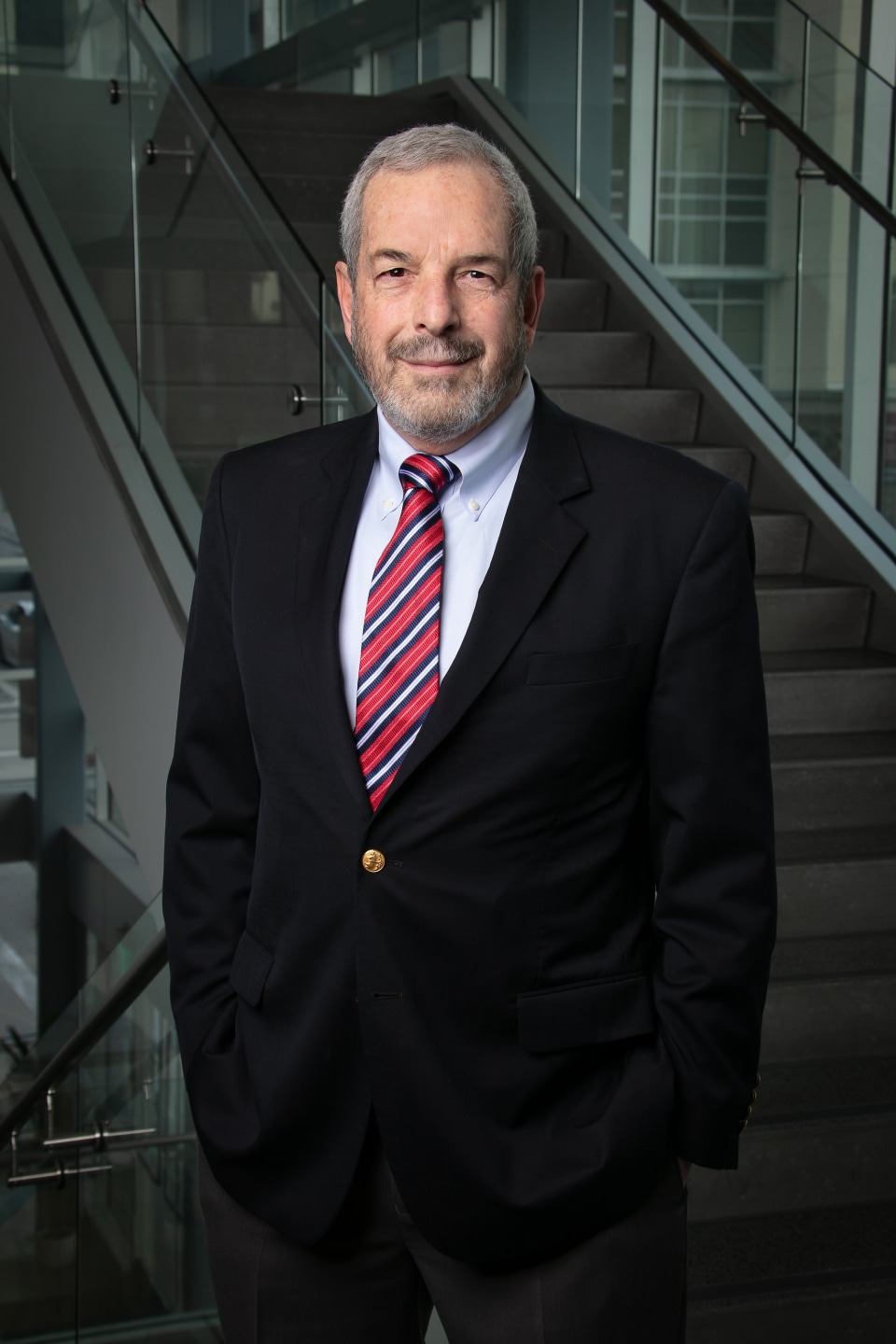 Cardiovascular Research Laboratory" width="960" height="1200">
Cardiovascular Research Laboratory" width="960" height="1200">
Robert A. Kloner, MD, PhD
Chief Science Officer
Chair, Cardiovascular Research
Cardiovascular Research Laboratory
Robert A. Kloner, MD, PhD, is Chief Science Officer and Director of Cardiovascular Research at Huntington Medical Research Institutes (HMRI). He serves as Professor of Medicine (Clinical Scholar) at Keck School of Medicine at University of Southern California (USC) and Visiting Associate at the Aerospace Division of Engineering and Applied Science at California Institute of Technology (Caltech) in Pasadena, CA. Prior to accepting an appointment at HMRI, Dr. Kloner served as Director of Research of the Heart Institute of Good Samaritan Hospital in Los Angeles from 1987 to December 2014. He has run nationally and internationally known cardiovascular research programs for over 45 years, training dozens of medical scientists, and collaborating with scores of physician scientists, numerous research institutions and medical industries world-wide.
In the 1970s, Dr. Kloner received his BS and MD in the Honors Program in Medical Education at Northwestern University, and his PhD in Experimental Pathology from Northwestern University Medical School where he trained in the laboratory of Dr. Robert Jennings. Dr. Kloner is a member of Alpha Omega Alpha honor society. He completed his internship and residency in internal medicine at Peter Bent Brigham Hospital and Harvard Medical School in Boston, Massachusetts (1975-1978). Additional training included clinical and research fellowships in medicine and cardiology (with Eugene Braunwald, MD, and Peter Maroko, MD) at Harvard Medical School and Brigham and Women’s Hospital. He served as Assistant and then Associate Professor of Medicine at Harvard Medical School and was an attending cardiologist at Brigham and Women’s Hospital (1979-1984). He was the recipient of an Established Investigator Award of the American Heart Association (AHA), he is a fellow of the American College of Cardiology, an Inaugural Fellow of the Council on Basic Cardiovascular Sciences of the AHA, and Dr. Kloner was elected to the American Society of Clinical Investigation. In 2015, he was elected a Fellow of the Cardiovascular Section of the American Physiology Society.
Dr. Kloner has made major contributions to the understanding and treatment of heart disease, receiving funding from the National Institutes of Health (NIH), American Heart Association (AHA), Environmental Protection Agency (EPA), Department of Defense (DOD) and numerous corporations and private foundations. He performed some of the first studies on and helped define the concepts of no reflow in the heart, stunned myocardium, remote ischemic preconditioning, and triggers of cardiovascular events. He has made major contributions to the understanding of pathophysiology of heart attack, treatments for heart attack; studies on high blood pressure and heart failure; the effect of toxins like alcohol, cocaine, electronic cigarettes and pollution on the heart; stem cell therapy for the heart; and the intersection between sexual dysfunction and cardiovascular disease. Dr. Kloner is also collaborating with a bio-engineering group (cell phone app) at USC for noninvasive assessment of heart function. A frequent contributor to the medical and scientific press, Dr. Kloner has authored or co-authored 774 original papers in peer-reviewed journals, 222 chapters or monographs, and 574 abstracts (as of 2024). Dr. Kloner is the author and editor of 18 medical texts including: Cardiovascular Trials Reviews (10 editions); The Guide to Cardiology (3 editions); Stunned Myocardium; Ischemic Preconditioning; VIAGRA; and Heart Disease and Erectile Dysfunction. In addition, he has written and published three medical science fiction novels, and released an album of neo-classical piano compositions entitled “Tunes from Edmonson Alley,” in 2024.
Among his editorial responsibilities, Dr. Kloner served as editor-in-chief of the Journal of Cardiovascular Pharmacology and Therapeutics (2009-2019). He has served as Guest Editor of Circulation. He is on the editorial boards of American Journal of Cardiology, Basic Research in Cardiology, International Journal of Impotence Research, Journal of Cardiovascular Pharmacology and Therapeutics, Regenerative Medicine, and Life Sciences. Among his many career distinctions, Dr. Kloner has been listed in Who’s Who in America, The Best Doctors in America, and in 2002 was cited by the Institute for Scientific Information as one of the most highly cited scientific authors. He has an H-index of 137 and is cited over 87,350 times as per Google Scholar. Dr. Kloner is a frequent lecturer at major scientific symposia including the Scientific Sessions of the American Heart Association, and he has lectured at most major academic medical centers in the United States. He has taught at both the Keck School of Medicine at USC and lectured at Caltech.
 Cardiovascular Signaling Laboratory" width="960" height="1200">
Cardiovascular Signaling Laboratory" width="960" height="1200">
Nicole H. Purcell, PhD
Professor, Cardiovascular Research
Scientific Director, Education Programs
Cardiovascular Signaling Laboratory
Nicole H. Purcell, PhD, leads the Cardiovascular Signaling Laboratory at Huntington Medical Research Institutes (HMRI) and serves as the Institutes’ Scientific Director of Education Programs. She joined Huntington Medical Research Institutes in 2021 to pursue two passions: her research on intracellular signaling pathways involved in cardiovascular disease and training and nurturing the next generation of scientists and doctors.
Before joining HMRI, Dr. Purcell spent almost 14 years at the University of California at San Diego as faculty in the Department of Pharmacology. Her contributions to science include the regulation of signal transduction pathways in the heart, investigating the role of MAP kinases and related enzymes in cardiac diseases, and therapeutically targeting newly discovered phosphatase (PHLPP) that impacts the physiology and pathophysiology of the heart and brain.
In addition to her role as Associate Professor of Cardiovascular Signaling, Dr. Purcell serves as scientific director of HMRI’s Postdoctoral Fellowship, Summer Undergraduate Research Fellowship (SURF), inaugural STEM Program for Pasadena rising juniors and seniors, year-round biomedical research internship, and the American Heart Association Supporting Undergraduate Research Experience (AHA SURE). She has a unique ability and passion for mentoring individuals who wish to pursue careers in various scientific and medical fields.
Dr. Purcell completed her PhD in Molecular and Cellular Pathology at the University of Alabama Birmingham and her postdoctoral work with Dr. Jeffery Molkentin at Cincinnati Children’s Hospital Medical Center. She was appointed an Assistant Professor in the Department of Pharmacology in 2011 and an Associate Professor in 2017.
Dr. Purcell has been a member and distinguished leader of the North American Section of the International Society for Heart Research (NAS-ISHR) for over 15 years. Currently, she serves as Chair of the NAS-ISHR MCI Committee, as a member of the NAS-ISHR Leadership Committee, as Co-Chair of the International MCI Planning Committee for the World Conference in 2025, and as Treasurer of NAS-ISHR. Additionally, Dr. Purcell is actively involved in the American Heart Association. She serves on several committees for the AHA Basic Cardiovascular Science (AHA BCVS) Council and is the social media editor for Circulation Research.
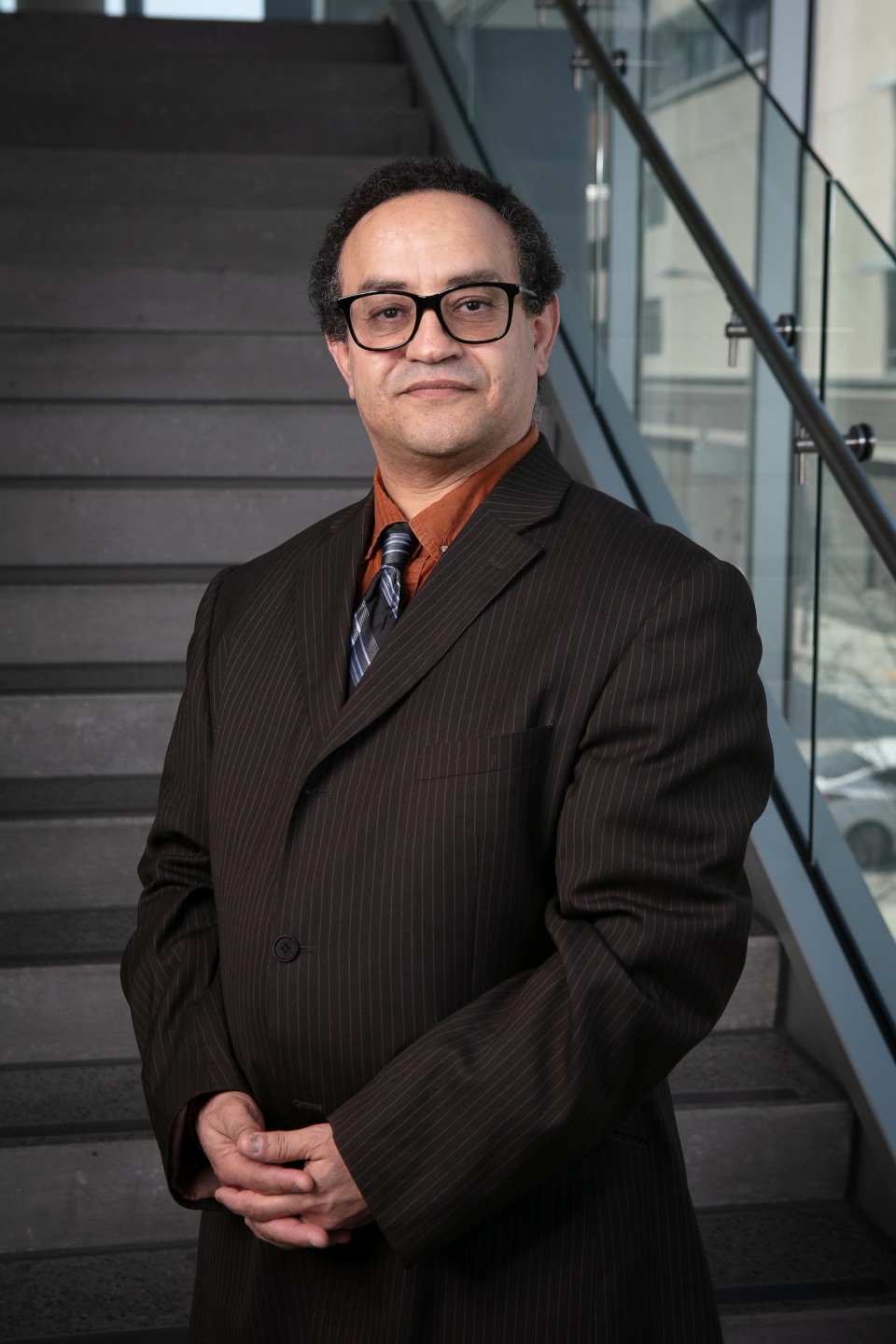 Neuro- Cardio- Immunology Laboratory" width="960" height="1200">
Neuro- Cardio- Immunology Laboratory" width="960" height="1200">
Abdala Elkhal, PhD
Assistant Professor, Immunology
Neuro- Cardio- Immunology Laboratory
Abdala Elkhal, PhD, assistant professor of Immunology and head of the Neuro- Cardio- Immunology Laboratory at HMRI, leads research focused on the role of nicotinamide adenine dinucleotide (NAD+) in immune system regulation and its therapeutic potential to reduce inflammation and reverse diseases.
Dr. Elkhal received his PhD in Cell Biology and Biochemistry from the University Rene Descartes Paris V, France, and completed his postdoctoral work at Boston Children’s Hospital / Harvard Medical School. From 2006-2020, Dr. Elkhal was a faculty member in the Departments of Medicine and Surgery at Harvard Medical School. In 2022, Dr. Elkhal joined HMRI as a lead investigator to study the role of nicotinamide adenine dinucleotide (NAD+) in immunity and inflammatory diseases, including neurological and cardiovascular diseases, and their vital connection. Dr. Elkhal’s was the first to identify NAD+, a natural co-factor found in all living cells, as a major regulator of the immune system. He has shown that NAD+ regulates CD4+ T cell differentiation independently of major antigen-presenting cells (APCs) and TCR-MHC crosstalk. His work has potential use and benefits in numerous inflammatory diseases, including autoimmune conditions, diabetes, stroke, hemophilia, infectious disease, and transplantation.
Dr. Elkhal’s laboratory has shown that nicotinamide adenine dinucleotide (NAD+) can trigger an immune response in the absence of antigen, APCs, and MHC-TCR interaction. Dr. Elkhal’s team has demonstrated that NAD+ mediates this immune response via mast cells, which are mainly considered to play a role in allergic immune response. Moreover, Dr. Elkhal’s lab has shown that NAD+ could protect against autoimmune diseases and lethal infections. The lab is still investigating how NAD+ regulates other immune cells and its application in other life-threatening diseases. Dr. Elkhal’s work has unraveled a novel pathway that does not require APCs and MHC-TCR interaction and is able to regulate immune cells, including macrophages, dendritic cells, mast cells, CD4+and CD8+ T cells. This promising novel pathway will allow us to further understand how immune cells communicate and will help to develop novel therapeutic methods for diseases or inflammatory processes such as autoimmune diseases, infection, and hemophilia, and in the field of transplantation.
Dr. Elkhal’s current research focuses on studying the impact of NAD+ in cardiovascular diseases. Cardiovascular disease (CVD) is the leading cause of death in the United States and throughout the world. Among CVD, coronary heart disease (CAD) is the most common type of CVD, as well as cerebrovascular disease, including stroke and transient ischemic attack. One project investigates whether NAD+ can protect or ameliorate heart function following myocardial infarction (Fig. 3). A second project focuses on creating an innovative approach to enhance coagulation and develop new treatments for blood disorders like hemophilia and hemorrhage. Finally, Dr. Elkhal’s research centers on brain inflammation and neurological disorders associated with aging.
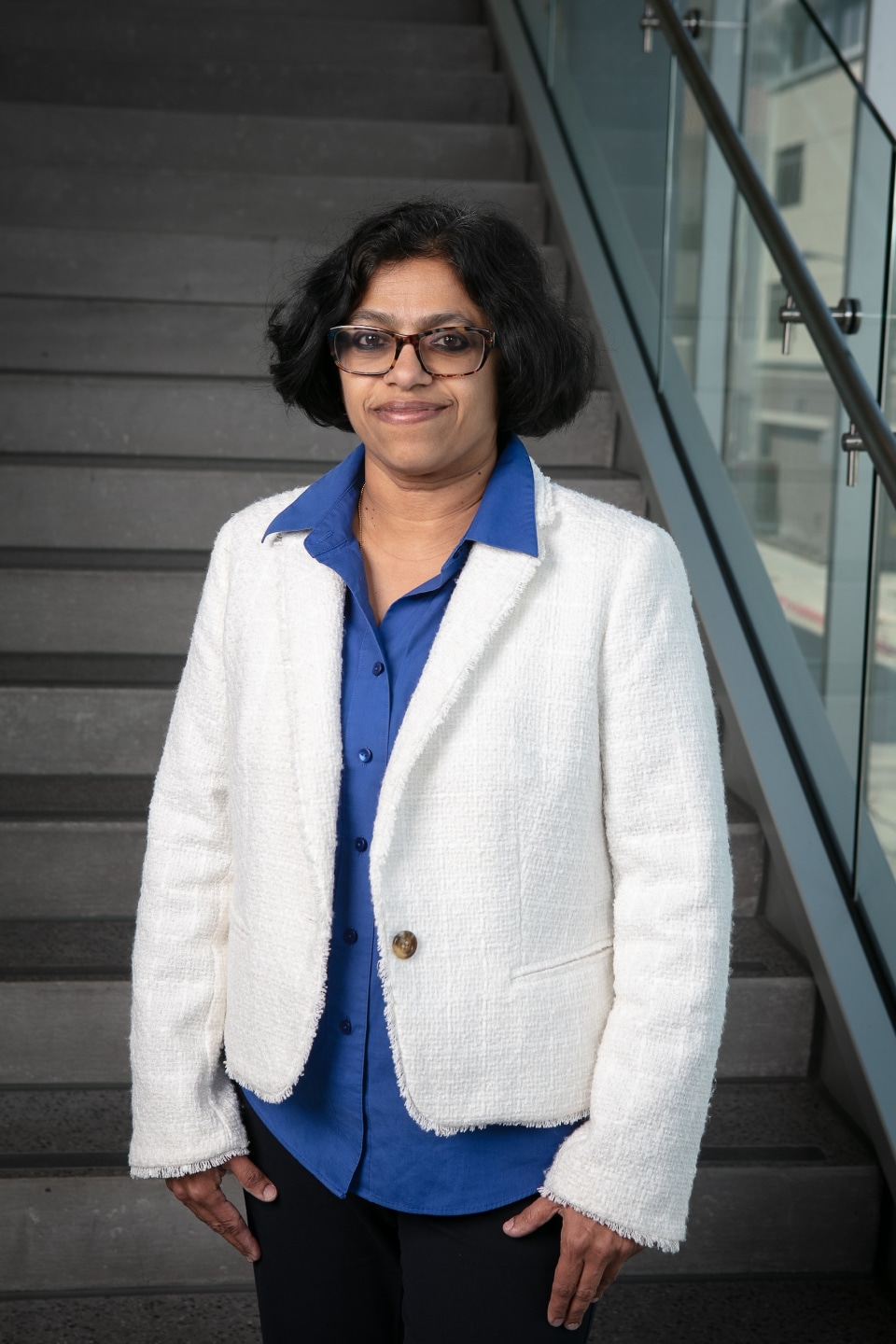 Angiogenesis and Brain Development Laboratory" width="960" height="1200">
Angiogenesis and Brain Development Laboratory" width="960" height="1200">
Anju Vasudevan, PhD
Professor, Chair and Scientific Director
Basic and Translational Neurosciences
Angiogenesis and Brain Development Laboratory
Anju Vasudevan, PhD serves as HMRI's Professor of Neuroscience and Chair/Scientific Director of the Department of Neurosciences, which conducts basic and translational research in developmental neuroscience, migraine, aging, and neurodegeneration.
Dr. Vasudevan received her PhD in neuroscience from the University of Cologne, Germany, and completed her postdoctoral work at Massachusetts General Hospital/Harvard Medical School. From 2007 to 2020, she was a faculty member in the Departments of Neurology and Psychiatry at Harvard Medical School. Dr. Vasudevan established the Angiogenesis and Brain Development Laboratory at McLean Hospital in 2011.
In June 2020, Dr. Vasudevan joined HMRI as the Scientific Director of the Neurovascular Research Program and served as the Director of the Postdoctoral Program from 2020 to 2022.
Dr. Vasudevan’s research areas:
Dr. Vasudevan’s work on early embryogenesis of the forebrain vascular system has opened an entirely new conceptual framework from which to view this critical component of brain development. The research in her laboratory focuses primarily on defining mechanisms that govern central nervous system (CNS) angiogenesis, as well as how CNS angiogenesis influences key events in brain development and how that shapes our postnatal and adult behaviors. This work has implications for understanding and treatment of a variety of neuropsychiatric diseases like autism, epilepsy, schizophrenia, anxiety, and depression. Dr. Vasudevan has received the NARSAD Young Investigator Grant and the NARSAD Independent Investigator Grant from the Brain & Behavior Research Foundation, as well as awards from the National Institute of Mental Health and the National Institute of Neurological Disorders and Stroke.
One in four people in the USA and worldwide suffers from some form of neuropsychiatric illness during their life. While drugs and therapies exist to treat some of the symptoms, there are no cures.
Dr. Vasudevan’s research program investigates key events of brain development and the ways those can go wrong, with the long-term goal of ensuring that early brain development remains on track. The lab uses a combination of developmental biology, genetics, cell biology, biochemistry, and imaging techniques in their research.
Endothelial cells are the building blocks of blood vessels. Work in Dr. Vasudevan’s laboratory has shown that blood vessel development molds brain cell development, and that there is remarkable endothelial cell diversity and function in the embryonic forebrain—a new insight. Blood vessel-related defects that originate during the brain’s earliest developmental stages play a role in neuropsychiatric illness in a way never imagined. Intrinsic neuronal defects thus far believed to cause schizophrenia, epilepsy, autism, and depression may in fact be a consequence of common molecular signals being defective, specifically in these endothelial cells. The lab is working to better understand how, why, and when this happens.
In addition, Dr. Vasudevan and her group are tapping into the potential of embryonic forebrain endothelial cells (mouse and human) in multiple ways to prevent the origin of diverse psychiatric symptoms by rescuing vascular defects in the prenatal brain, or by developing vascular therapies for repair and regeneration in the postnatal and adult brain.
Dr. Vasudevan’s contributions to science:
Dr. Vasudevan’s early works changed the dogma that endothelial cells are uniform, and that blood vessel formation is a passive process in response to neural signals. It depicted the diversity in embryonic forebrain vascular networks by differentiating them as pial versus periventricular, based on anatomy, origin, growth patterns, and developmental mechanisms. It changed notions of cerebral vascularization that implied that blood vessels sprout passively into the brain parenchyma from pial vascular plexuses to meet the metabolic needs of growing neuronal populations.
Vasudevan A, Long JE, Crandall JE, Rubenstein JLR and Bhide PG. Compartment-specific transcription factors orchestrate angiogenesis gradients in the embryonic brain.
Nature Neuroscience. 2008; 11(4): 429-39. PMID: 18344991
Vasudevan A and Bhide PG. Embryonic CNS angiogenesis: A new twist on an old tale; Cell Adhesion and Migration. 2008; 2(3): 167-169. PMID: 19262109
During 2011-2020, research from Dr. Vasudevan’s laboratory documented new mechanisms by which periventricular endothelial cells instruct neurogenesis (the generation of neurons/brain cells) and neuronal migration (the movement of brain cells to the appropriate circuits) in the embryonic forebrain. It illustrated the intimate and symbiotic relationship between endothelial cells and neurons of the developing brain that respond meticulously and independently to common signals, depending on the cell type that secretes it. It showed that periventricular endothelial cells have intrinsic programs that can significantly mold neuronal development and uncovered new insights into concepts and mechanisms of CNS angiogenesis from developmental and disease perspectives.
It implicated periventricular endothelial cells as being contributory to a wide swath of neuropsychiatric diseases—with schizophrenia, epilepsy, autism, mood and depressive disorders topping the list—revealing an important new problem. Furthermore, it established direct links between abnormal blood vessel development and alterations in behavior, bringing fresh perspectives on the vascular origin of mental illness.
Won CK, Lin Z, Kumar PT, Li S, Ding L, ElKhal A, Szabo G and Vasudevan A. Autonomous vascular networks synchronize GABA neuron migration in the embryonic forebrain. Nature Communications. 2013; 4: 2149 (1-14). PMID: 23857367
Li S, Haigh K, Haigh JJ, and Vasudevan A. Endothelial VEGF sculpts cortical cytoarchitecture. The Journal of Neuroscience. 2013; 33(37): 14809-15. PMID: 24027281
Li S, Kumar PT, Joshee S, Kirschstein T, Subburaju S, Khalili JS, Kloepper J, Du C, Elkhal A, Szabó G, Jain RK, Köhling R and Vasudevan A. Endothelial cell derived GABA signaling modulates neuronal migration and postnatal behavior.
Cell Research-Nature. 2018; 28(2): 221-248. PMID: 29086765
Choi YK and Vasudevan A., Mechanistic insights into autocrine and paracrine roles of endothelial GABA in the embryonic forebrain, Scientific Reports. 2019; 9(1): 16256. PMID: 31700116
Her current work in the laboratory focuses on identifying new cellular and molecular substrates of neuropsychiatric disease origin and uses innovative approaches to harness the potential of CNS angiogenesis to find new cures. One project investigates whether pro-angiogenic compounds can serve to rescue neurovascular interactions during a critical developmental window and whether, in doing so, it may be possible to ameliorate behavioral symptoms. In another project, human endothelial cell transplantation is being used for the possibility of rescue of neural circuits in the diseased brain. A third project evaluates common molecular players in the brain and the heart vasculature that can lead to concurrent development of psychiatric and cardiac dysfunction. A fourth project seeks to identify new diagnostic tools and biomarkers to specifically distinguish between psychiatric disease categories through blood tests.
Dr. Vasudevan envisions a future where the “healing touch” of angiogenesis therapy will bring relief to patients suffering from mental health disorders.
Sivan S, Kaye S, Choi YK, Baruah J, Datta D, Ren J, Kumar AS, Fukumura D, Jain RK, Elkhal A and Vasudevan A. NAD+ mediated rescue of prenatal forebrain angiogenesis restores postnatal behavior. Science Advances. 2020; 6(41): eabb9766. PMID: 33036972
Datta D, Subburaju S, Kaye S, Baruah J, Choi YK, Nian Y, Khalili JS, Chung S, Elkhal A and Vasudevan A. Human forebrain endothelial cell therapy for psychiatric disorders. Molecular Psychiatry. 2021; 26(9): 4864-4883. PMID: 32661257
Agrud A, Subburaju S, Goel P, Ren J, Kumar AS, Caldarone BA, Dai W, Chavez J, Fukumura D, Jain RK, Kloner RA, and Vasudevan A. Gabrb3 endothelial cell-specific knockout mice display abnormal blood flow, hypertension, and behavioral dysfunction. Scientific Reports. 2022; 12(1): 4922. PMID: 35318369
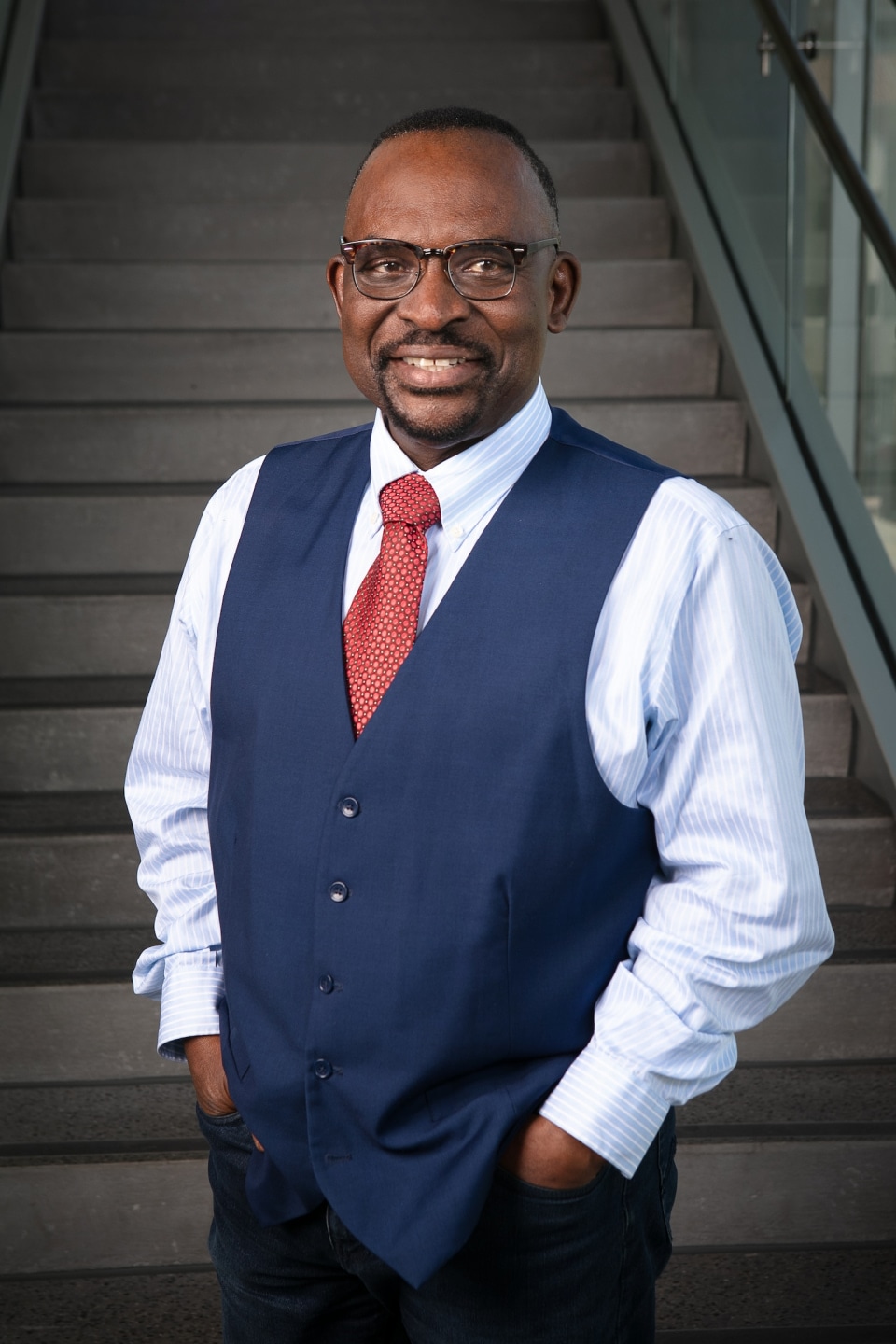 Biomarker and Neuro-disease Mechanism Laboratory" width="960" height="1200">
Biomarker and Neuro-disease Mechanism Laboratory" width="960" height="1200">
Alfred N. Fonteh, PhD
Research Professor, Clinical and Translational Neurosciences
Biomarker and Neuro-disease Mechanism Laboratory
The Biomarkers Neuro-Disease Mechanism Lab (BNML) is led by Alfred Fonteh, PhD, who has investigated biomarkers and mechanisms of Alzheimer’s disease for 21 years. Alzheimer’s disease (AD) is the most common form of dementia and the seventh leading cause of death in the United States. According to recent statistics from the Alzheimer’s Association, 6.7 million people aged 60 or older are living with Alzheimer’s disease in the United States. Dr. Fonteh was inspired by family members and friends who have suffered from AD without any medical help and is dedicated to discovering potential biomarkers for Alzheimer’s disease in the early stages of pathology. Dr. Fonteh is also interested in investigating AD causes for pharmacologic and non-pharmacologic therapies and preventive options.
There is an incipient and silent (preclinical) stage of Alzheimer’s disease before the emergence of cognitive symptoms of either Mild Cognitive Impairment (MCI) or dementia. More research is needed to understand if this preclinical stage is a valid representation of people who may go on to develop Alzheimer’s disease. Dr. Fonteh’s lab is well-focused on the establishment of a conclusive connection between biomarkers and the preclinical stage of Alzheimer’s disease.?With advancements in early detection, there is potential for patients to learn about their risk for AD before clinical symptoms appear and receive early treatment. Dr. Fonteh has mentored numerous young scientists with similar research interests over the course of his career. One of his current mentees is Joby Jose, PhD, a postdoctoral fellow in the BNML lab who focuses on experiments for biomarkers. Together, Dr. Fonteh and Dr. Jose work closely with the Clinical Brain Aging Group and the Analytical Biochemistry Core (ABC), which manage clinical recruitment and classification and maintain sophisticated laboratory equipment, respectively.
The primary focus of research in BNML is on non-invasive biomarkers that enable the widespread screening and early diagnosis of Alzheimer’s disease. The laboratory has successfully studied the correlation between energy-related and oxidatively derived short-chain and medium-chain lipids in cognitively healthy (CH), Mild Cognitive Impairment (MCI), and Alzheimer’s disease (AD) subjects. We are currently investigating the fluctuations of brain-derived lipids in subjects at various stages of Alzheimer’s disease. Other significant studies in our laboratory include the correlation between bioenergetics and mitochondrial dysfunction and disturbances in the neuromodulator pathways associated with Alzheimer’s disease.
 Cognition and Brain Integration Laboratory" width="960" height="1200">
Cognition and Brain Integration Laboratory" width="960" height="1200">
Xianghong Arakaki, MD, PhD
Associate Professor, Clinical and Translational Neurosciences
Cognition and Brain Integration Laboratory
Xianghong Arakaki, MD, PhD, is an Associate Professor of Clinical and Translational Neurosciences at HMRI and Head of the Cognition and Brain Integration Lab (CBIL). Dr. Arakaki received her MD from the Medical College of Tongji University in Shanghai, China; her MS in neurobiology from the Medical Center of Fudan University in Shanghai; and her PhD in neuroscience from the University of Tennessee. Her research interests focus on heart-brain connections in neurological conditions, including pre-symptomatic Alzheimer’s disease, migraine, and traumatic brain injury, using a multidisciplinary approach. She is the recipient of R56 and R01 awards from the National Institute of Aging and the National Institute of Neurological Disorders and Stroke. She has trained many undergraduate students and postdoctoral fellows. Dr. Arakaki reviews grants for the National Institute of Health and other federal and state agencies. She actively serves the scientific community, including the Institutional Animal Care and Use Committee (IACUC) committee and Alzheimer’s Association.
With dual backgrounds in medicine and neuroscience, Dr. Arakaki has expertise in both in vivo and in vitro electrophysiology: evoked potentials, electroencephalogram (EEG), and electrocardiogram (ECG) involving migraine, traumatic brain injury, and pre-sympathetic Alzheimer’s disease, which fuels her passion for translational and human research. Alongside colleagues and collaborators, Dr. Arakaki is interested in systemic neurophysiological signatures of cognitively healthy individuals at elevated risk for cognitive decline, revealed by non-invasive assessment of conscious, subliminal, and autonomic (CSA) system processing using cognitive challenge testing. Dr. Arakaki’s team is focused on the subtle changes of CSA during core executive function challenging (working memory, Stroop, or task shifting) in a cognitively healthy (CH) population. This reveals compensatory neural mechanisms and decreased cognitive control in those at elevated risk of cognitive decline.
Additionally, Dr. Arakaki investigates the role of sodium homeostasis dysfunction in migraine. Among disorders affecting the nervous system, migraine ranks third globally in terms of disability-adjusted life-years. Therefore, it is critically important to understand how migraines begin. Translational work suggests that changes in sodium concentration ([Na+]) in the cerebrospinal fluid (CSF) occur at migraine onset, possibly caused by choroid plexus (CP) Na, K-ATPase dysfunction. Dr. Arakaki investigates the roles of the choroid plexus and sodium dysregulation in migraine with colleagues and collaborators.
Dr. Arakaki’s early work explored methods to monitor sodium disturbance in rodent migraine models. One study focused on how increased extracellular sodium elevates neuronal excitability using primary cultured neurons, replicated by NEURON simulation. Another study used immunostaining to show that the Na+, K+-ATPase isoforms maintain sodium homeostasis in the key CSF production location at the choroid plexus. Additionally, in translational models, Dr. Arakaki found that brainstem auditory evoked potentials (BAEPs), specifically peak latency and inter-peak latency, were prolonged after nitroglycerin triggering of sensitization, reflecting changes in neurotransmitters and/or hypoperfusion in the midbrain. The results further validate the rodent migraine model for translational migraine research. Her earlier EEG research in mild traumatic brain injury suggested that patients with concussion presented with compensatory brain activation during working memory challenge, as well as decreased learning. This may relate to reduced neural efficiency and multiple concussion occurrences from a lack of safety learning.
